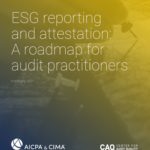Investor Responsibility Research Center (IRRC) has released its second annual report on the fees public companies pay to their auditors. Audit versus Non-Audit Fees: What U.S. and U.K. Companies Pay Their Auditors indicates that increasing audit failures and corporate scandals had some, but not much, impact on how and how much companies paid their auditors in 2001 and early 2002.
This year’s analysis included data from 1,245 U.S. companies in the S&P 500, MidCap and SmallCap indexes as well as — for the first time — 500 of the largest British public firms. IRRC examined fees reported in proxy statements issued in 2002, and found that 72% of the total fees that U.S. companies paid to their auditors were for non-audit services, exactly the same as in the prior year. The median level was 60%, compared with 61% previously.
In the U.K., a surprising 67% of the total fees paid to company auditors also related to non-audit services. Consulting fees paid by U.K. companies to their auditors appear to have increased dramatically in the last several years. According to a 1994 IRRC survey, only 33% of 141 large U.K. companies paid non-audit fees equal to or greater than the amount paid for their audit. By contrast, 58% of the U.K. companies studied this year paid more in non-audit fees than they did for their audits.
The highest amount paid by a U.S. company for non-audit services was $85.9 million, billed to J.P. Morgan Chase by PricewaterhouseCoopers (PwC). The top figure in the U.K. was only somewhat less¾Unilever paid $67.6 million to PwC for its consulting services. On average, however, U.S. companies pay more for non-audit services than their British counterparts: The mean was $3.2 million for U.S. companies compared with $2.2 million in the U.K.
The U.S. companies paying the most for non-audit services included:
J.P. Morgan Chase — $85.9 million of $104.3 million paid to PwC
General Motors — $81 million of $102 million paid to Deloitte &Touche (D&T)
Raytheon — $80 million of $84 million paid to PwC
AT&T — $71.6 million of $78.2 million paid to PwC
Interestingly, the two companies paying the highest non-audit fees as a percentage of total charges are both U.K-based.T&S Stores (97% of $4.6 million in aggregate fees to PwC) and British Sky Broadcasting Group (96% of 20.9 million in aggregate fees to Andersen). Four U.S. companies tied for the highest non-audit portion.95% of the total fees were for non-audit services at Raytheon, Marathon Oil, Ohio Casualty, and Royal Appliance Manufacturing.
U.S. and U.K. companies pay about the same, on average, for audit services. The mean audit fee reported by the U.S. companies was $1.3 million, compared with a mean of $1.1 million among the U.K. companies examined. The top fee paid for audit services by U.S. and U.K. companies was also about the same: Citigroup paid $24.7 million in audit fees to KPMG, while U.K.-based HSBC Holdings paid $24.3 million, also to KPMG.
The five U.S. companies in the study that paid the most for their audits were:
Citigroup — $24.7 million of $56.3 million in total fees to KPMG
General Electric — $23.5 million of $60.6 million in total fees to KPMG
Merrill Lynch — $21.6 million of $57.9 million in total fees to D&T
General Motors — $21 million of $102 million in total fees to D&T
Morgan Stanley — $20.8 million of $53.3 million in total fees to D&T
The five U.K. companies in the study that paid the most for their audits were:
Lloyds TSB — $24.7 million of $30.5 million in total fees to PwC
HSBC Holdings — $24.3 million of $37.6 million in total fees to KPMG
BP — $24 million of $83 million in total fees to E&Y
Shell Transport & Trading — $18 million of $50 million in total fees to KPMG
Unilever — $14.2 million of $81.9 million in total fees to PwC
Only six U.S companies — AXT, Entercom Communications, Fremont General, Insurance Auto Auctions, Watsco, Western Gas Resources.did not pay any fees to their accountants for non-audit services. These six companies represent less than 1 percent of the U.S. companies analyzed. Nine U.K. companies, representing 2.4 percent of those analyzed¾did not use their auditor for non-audit services: Abacus Group, Allders, CLS Holdings, Crest Nicholson, Laura Ashley, Morgan Sindall, Senior, St. James’s Place Capital, and WMRC.
"Increasing investor concern about potential conflicts of interest when accountants earn the majority of their revenue by consulting to the companies whose books they audit did apparently have some impact on company behavior," notes study author Allie Monaco of IRRC’s Governance Research Service. While the percentage of total fees related to non-audit work remained at 72 percent among the U.S. companies overall, it represented only 66 percent in the subset of companies whose fiscal years ended after Dec. 31, 2001, in the wake of Enron’s meltdown and rising suspicions about the integrity of other corporate financial reports.
The difference was due solely to a drop in the proportion of IT-related fees, from 9 percent among companies whose fiscal years ended on Dec. 31, 2001 or earlier, to just 3 percent among the later reporting companies. Such fees are now banned under the landmark Sarbanes-Oxley Act ("Act"), which is expected to significantly impact how accounting industry operates. Among other things, the Act requires top corporate officers to certify the veracity of their firms’ financial statements and increases penalties if their companies flout accounting rules. The legislation also specifically bans some non-audit services by auditors (such as financial IT consulting), and should substantially reduce the amounts that U.S. companies pay their auditors for consulting work in the future. Accounting firms may continue to perform some non-audit work for their audit clients, however, including tax and benefits services, if that is approved in advance by the company.s audit committee or, in some circumstances, when pre-approval is waived. Audit committee approval of any non-audit services must be disclosed in the company’s periodic reports, so shareholders are aware of the action.



